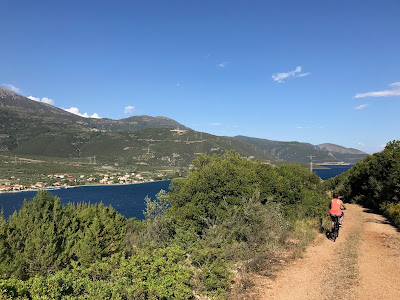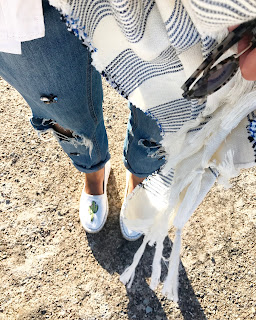“ROLL on, thou deep
and dark blue Ocean, roll.
Ten thousand fleets sweep over thee in vain;
Man marks the earth with ruin;
his control stops with the shore.”
Lord Byron
Ten thousand fleets sweep over thee in vain;
Man marks the earth with ruin;
his control stops with the shore.”
Lord Byron
---֍---
When we decided to take half a late gap year, six months at
sea was an early suggestion, which was hard to match. It didn't take long to start looking for boats and lunch breaks spent on Google maps to work-out
distances and destinations for the Med.
A typical bought of 'backpack and bracelets' traveling was
of course an option. But the hours in airports, bus stations and searching for
a hostel were, we felt, behind us. We wanted a different type of adventure.
Sure enough - the ruthless and frustrating hours typically spent in the process
of getting from 'backpacker destination' to 'cultural poi' and never ending
awareness to avoid being 'mugged off' - were replaced with the responsibility
of keeping the boat afloat, in one piece and in
working condition - engine, plumbing, electrics and all.
---֍---
The sea makes it difficult to keep things running and the
Greek gods have a sense of humour - that I can promise you.
---֍---
After six years of living in London, three weeks of sailing
has restored our faith in humanity. 'Sailors' are the most selfless strain of
the human race I have been a part of. Perhaps it is a mutual respect/fear of
the sea that drives sailors to go above and beyond for their fellow sea
dweller. Maybe the immense freedom of having an anchor relieves the mind and
inhibits our innate selfishness. Perhaps there is a genetic correlation between
the characteristics that attract a person to the unregulated freedom and
untameable danger of the sea and a genuine generosity. I have no idea, but let’s
start at the end.
---֍---
As I write we have just made it through the Corinth Canal,
an impressive 50 meter high man-made routing through the 5 mile stretch of limestone rock that used
to connect the Greek mainland to the Greek Peloponese. We’re at least a week
later than expected. Yesterday we were hunkered down in Corinth Yacht harbour
on the west side of the canal after a long night of wind and swell. A burst
fender was the casualty, the boat, with a dent to the side, was the injured
soldier. But we survived. The night was a fitting cap for the previous ten days.
I would say now though that it was worth it, not just for this morning’s
sailing in the Aegean with a Force 4 on the beam, beer in hand. It was worth it
for the people we met, who advised, taught and helped us.
---֍---
We left Zakynthos island after a few days of strong winds during
which we sorted the boat and ‘provisioned up’. The harbour is friendly and
quiet, but not the best protection. Of course it’s free.
Our first heading was for the ferry port of Kyllini on the mainland, about
four hours sail, anchoring in a not-so-peaceful bay outside the harbour. The
next day we left first thing, noticing that the engine-driven fridge compressor
was no longer spinning. We adjusted the belts and eventually added a new one but
to no avail. The engine itself seemed ok so we carried on North to Missolonghi – where Lord
Byron spent the final years of his life giving the last of his money to the
much obliging Greek purse. The small fishing town has a historic and something
of an Asian feel to it, with salt marshes creating a rare buffer between the
sea and steep Greek mountains. We had read of a marina North of the town quay and
hoped to try our luck for a mechanic to give us some advice - our hope was soon
dampened by the half-built sorry state of affairs we found there. So the next
day we decided to give the town a miss and divert three hours South to Patras,
the third largest city in Greece. Within two hours of berthing in the mid-priced
marina on a Sunday afternoon we had seen a mechanic and fridge specialist. Two
days later after parts and revisits we were good to go. Too good to be true for
sure, so the Greek gods gave us a blocked holding tank to fix – probably the
least fun job of the trip, in rough sea three miles off land. But we managed to
unblock it within the hour. Radio the Rio-Antirrio bridge – here we come!
The fourth stop after leaving Zakynthos was the only inhabited island in the Gulf of Corinth: Trizonia. This
place was certainly a destination, not a stop-off as we had previously imagined.
The three kilometre square island had a small, sheltered but unmanaged
(therefore free) marina and a town which consisted of a hotel, three tavernas
and a church. Plus a rocky dirt track to watch Emily struggle around on our
fold up city-bikes. But the tick-box nature of the place, despite its adequacy
for 'travel blog weekly' paled to invisibility by the people we met there. On
arrival we were immediately on the lookout for the local mechanic mentioned in
the pilot book for advice on our ‘clicking’ engine. But we laid it to rest for
the evening in favour of free wifi and dinner at the local taverna. I
challenged a Scottish husband and wife team (Stuart & Anne) to a race after
they turned up on their fold-up bikes. Their acquaintance with the waiter
suggested familiarisation and sure enough they wintered their Bavaria 44 near
to where we had berthed. So the next day we cycled round to ask if they knew where
we could find the ‘man with the tools’. Invited aboard we were duly informed that
no mechanic had lived on the island for years, the marina was self run by the
group that kept boats there and any works were muddled through between them.
Half an hour later Stuart set to work on Hodja with his multi-meter, teaching
us about our own engine and how the electrics work – he diagnosed a broken
alternator - so no hot water, or electricity. He helped us cable our solar panels and introduced us to our local
German hero.
Reinhard renovated boats in Trizonia 'marina' and new three of everyone on the nearby mainland. He was seventy, and from what I could tell worked seven days a week. He spoke seven languages and had lived in as many countries. He spoke philosophically about these places and the need to travel and learn of other cultures in order to know about your own biases and limitations. Why you think the way you do. He spoke of watching the Rolling Stones in Hyde Park, Pink Floyd, drugs, mods & rockers and the last true freedom of the seven seas. He was genuinely inspiring and his thoughts were eye opening. The Asians talk of lucky number seven right?
 |
| Lots of old boats abandoned in Trizonia. |
 |
| The better part of the dirt track. |
 |
| No hot water equals showering in the chilly sea! |
 |
| Solar panels. |
---֍---
---֍---
Reinhard picked up our starter motor and his wife ferried it
to and from the mainland to be mended, brought back and fitted. They also
picked up some engine belts later in the week, he helped us mend our gear
stick, lent us tools and gave us invaluable advice for the months ahead, with
the caveat that we pass on the unassuming and selfless help that he showed us. In
all it took a week, frustrating at times but a pretty good place to be
stranded. It made us slow down and we soon caught up other boats we had passed
earlier in the passage.
The next port of call was Galaxidi for a quick stop-off and re-provision before a long day’s passage in tough weather down to Corinth where we grounded the boat, picked-up a few extra engine spares,
sheltered from the bad weather for a day and finally made it through the Corinth Canal.
 |
| Not always plain sailing in the Med! |
 |
| Waiting in Corinth harbour for some decent weather. |
---֍---



























